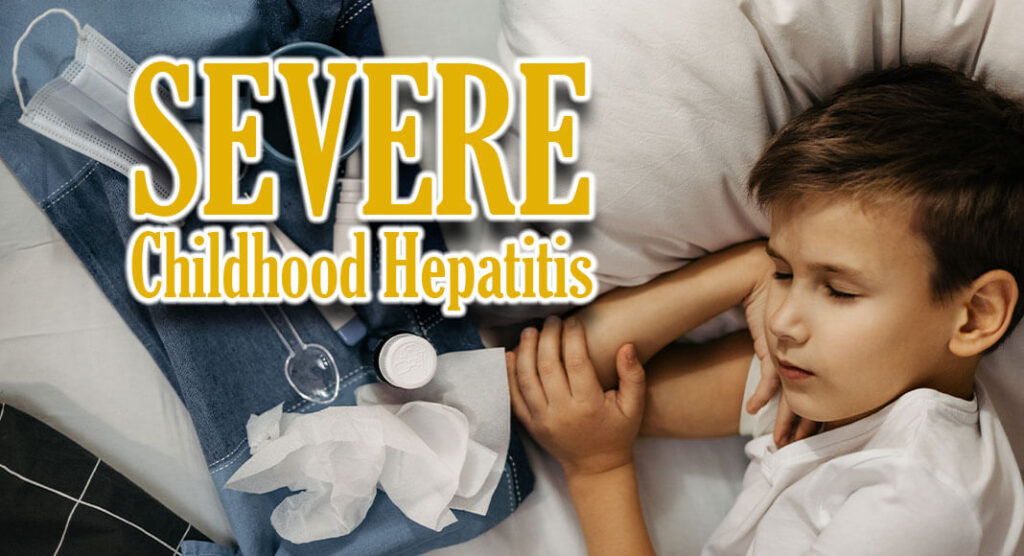
Mega Doctor News
The European Center for Disease Prevention and Control (ECDC) reported some 190 unexplained cases of severe hepatitis in children worldwide.
The outbreak was first reported this month in the UK, which has seen 111 cases – most in children under 10 – and has since been identified in at least 12 countries around the world including the US and Israel.
About 40 cases have been reported in the European Union and the European Economic Area, ECDC Director Andrea Ammon said.
Severe hepatitis, or inflammation of the liver, is rare in otherwise healthy children.
Exceptionally, the new cases do not present the viruses typically responsible for acute inflammation of the liver: hepatitis A, B, C, D and E.
According to the WHO, 17 children have needed liver transplants, and one has died.
Ammon said research so far points to a link to infection with an adenovirus, a family of common viruses that can cause flu-like or gastrointestinal symptoms.
As she pointed out, one of the theories is that the Covid-19 lockdowns may have weakened children’s immunity, because they were less exposed to common pathogens while isolated.
Scientists are also investigating whether the adenovirus involved has mutated or is acting in conjunction with another infection, possibly Covid-19.
Any relationship with vaccination against Covid-19 has been ruled out.
CDC Alerts Providers to Hepatitis Cases of Unknown Origin
CDC issued a nationwide health alert to notify clinicians and public health authorities about a cluster of children identified with hepatitis and adenovirus infection – and to ask all physicians to be on the lookout for symptoms and to report any suspected cases of hepatitis of unknown origin to their local and state health departments.
CDC is currently working with the Alabama Department of Public Healthexternal icon to investigate a cluster of nine cases of hepatitis of unknown origin in children ranging in age from 1 to 6 years old, all of whom were previously healthy. None of these children were at the hospital because of a current SARS-CoV-2 infection. The first U.S. cases were identified in October 2021 at a children’s hospital in Alabama that admitted five children with significant liver injury (including some with acute liver failure) without known cause, who also tested positive for adenovirus. Hepatitis A, hepatitis B, and hepatitis C viruses were ruled out.
Upon investigation, a review of hospital records identified four additional cases, all of whom had liver injury and adenovirus infection; laboratory tests identified that some of these children had adenovirus type 41, which more commonly causes pediatric acute gastroenteritis. No known epidemiological link or common exposures were found among these children. A statewide alert to elicit additional cases on February 1, 2022, has not yielded any further reports.
CDC is also aware of an increase in cases of pediatric hepatitis without a known cause recently reported in Europeexternal icon, and has been in contact with our European counterparts to understand what they are learning. Adenovirus has been confirmed in several of the European cases, but not all.
Symptoms of hepatitis, or inflammation of the liver, include fever, fatigue, loss of appetite, nausea, vomiting, abdominal pain, dark urine, light-colored stools, joint pain, and jaundice and can be caused by viruses. Adenoviruses spread from person-to-person and most commonly cause respiratory illness, but depending on the type, can also cause other illnesses such as gastroenteritis (inflammation of the stomach or intestines), conjunctivitis (pink eye), and cystitis (bladder infection). Adenovirus type 41 typically presents as diarrhea, vomiting and fever, often accompanied by respiratory symptoms. While there have been case reports of hepatitis in immunocompromised children with adenovirus infection, adenovirus type 41 is not known to be a cause of hepatitis in otherwise healthy children.
CDC is working with state health departments to see if there are additional U.S. cases, and what may be causing these cases. At this time, we believe adenovirus may be the cause for these reported cases, but investigators are still learning more – including ruling out other possible causes and identifying other possible contributing factors. So far, other common causes of viral hepatitis, such as Hepatitis A, B, and C have been ruled out. CDC and state public health officials will continue to work together in close collaboration with clinicians to identify and detect unusual patterns or clusters of illness to prevent further disease.
CDC is asking physicians to consider adenovirus testing for pediatric patients with hepatitis of unknown etiology, and to report any possible cases of hepatitis of unknown origin to CDC and state public health authorities. In addition, we encourage parents and caregivers to be aware of the symptoms of hepatitis, and to contact their healthcare provider with any concerns. We continue to recommend children be up to date on all their vaccinations, and that parents and caregivers of young children take the same everyday preventive actions that we recommend for everyone, including washing hands often, avoiding people who are sick, covering coughs and sneezes, and avoiding touching the eyes, nose or mouth. CDC will share additional information as it becomes available.










